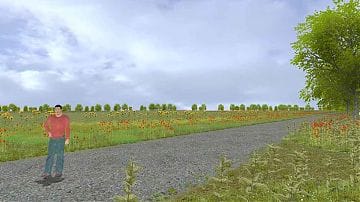
Visualisation of landscape scenarios for the cultivation of renewable raw materials
- Mission: 3D visualisation
- Client: Technische Universität Berlin, Fachgebiet Geoinformationsverarbeitung
- Duration: 2007/01/01 - 2007/12/31
- Sponsored by: Deutsche Bundesstiftung Umwelt
The current significant increase in the cultivation of renewable raw materials will continue in the medium term. These changes in land use lead to new synergies with nature conservation goals, but also harbour potential for conflict. The project, funded by the Deutsche Bundesstiftung Umwelt (DBU), was initiated with the aim of developing methods for the generally understandable presentation of predicted scenarios.
In-house software from Lenné3D was used for the simulations, which were generated both photorealistically and nonphotorealistically. Non-photorealistic representations were used in particular for the purpose of better highlighting special content such as the risk potential of certain crops. The content basis for the visualisation project was developed and provided as part of another DBU project entitled „Transferable strategies for nature-compatible biomass provision at district level“.
Due to their suitability as cultivation areas for renewable raw materials and the existing conflict potential, the districts of Ostprignitz-Ruppin (Brandenburg) and Traunstein (Chiemsee) were selected as project areas. At local events, the visualisations were used as a basis for information and to support communication.
